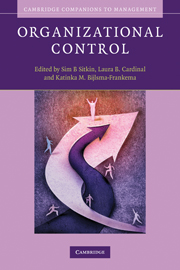Book contents
- Frontmatter
- Contents
- List of figures
- List of tables
- Contributors
- Foreword
- Part I Introduction and history
- Part II Conceptions of organizational control
- Part III Identity, attention, and motivation in organizational control
- Part IV Relational control
- Part V Managerial and strategic control
- 12 Control to cooperation: examining the role of managerial authority in portfolios of managerial actions
- 13 Consequences and antecedents of managerial and employee legitimacy interpretations of control: a natural open system approach
- 14 Managerial objectives of formal control: high motivation control mechanisms
- 15 Control configurations and strategic initiatives
- Index of terms
- Author index
- References
13 - Consequences and antecedents of managerial and employee legitimacy interpretations of control: a natural open system approach
Published online by Cambridge University Press: 05 June 2012
- Frontmatter
- Contents
- List of figures
- List of tables
- Contributors
- Foreword
- Part I Introduction and history
- Part II Conceptions of organizational control
- Part III Identity, attention, and motivation in organizational control
- Part IV Relational control
- Part V Managerial and strategic control
- 12 Control to cooperation: examining the role of managerial authority in portfolios of managerial actions
- 13 Consequences and antecedents of managerial and employee legitimacy interpretations of control: a natural open system approach
- 14 Managerial objectives of formal control: high motivation control mechanisms
- 15 Control configurations and strategic initiatives
- Index of terms
- Author index
- References
Summary
In this chapter we present a natural open system approach to organizational control, as opposed to dominant approaches, which can be typified as either rational system approaches, closed system approaches (Scott,1987), or both. Our aim is to promote scholarly understanding of organizational control by drawing on a wider range of possible insights than dominant approaches do.
Two scholarly traditions, both with rather strong foci on certain aspects of control, have been prominent in the field. The first tradition, represented by agency theory and rational choice models of human behavior (Eisenhardt, 1989), focuses on rational choice of control mechanisms by managers, with the underlying assumption that control choices are driven by effectiveness and efficiency concerns. This focus typifies a rational system approach. The second tradition, represented by bureaucracy studies, draws on agency theory and the critical management tradition (for an overview of this tradition see Delbridge, Chapter 4) to focus on reactions to managerial control by those subjected to it. The studies in this tradition have mainly highlighted the constraining, harnessing, distrust-signaling perceptions of control. Both traditions can be typified as closed system approaches, since factors outside the organization, such as organizational environments, are not included in the analysis of employee reactions.
We propose to move from these rather narrow rational and closed system approaches to a more encompassing understanding of factors involved in shaping managerial choices and reactions of employees.
- Type
- Chapter
- Information
- Organizational Control , pp. 396 - 433Publisher: Cambridge University PressPrint publication year: 2010
References
- 18
- Cited by

